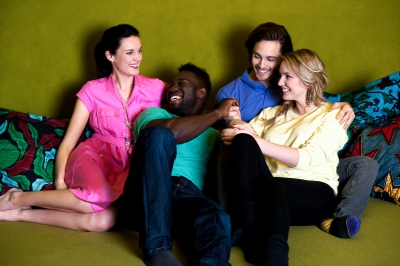Making friends with the idea of making friends.
/I try not to take myself too seriously as a therapist. Of course, psychotherapy is serious medicine that I am hugely passionate about, but I'm first and foremost a human being and secondarily a kick-ass therapist. In this vein, I find so much resonance with the youtube video blogger and life coach, JP Sears, a creator of hilarious spoof videos such as How to Become Gluten Intolerant (without being actually gluten intolerant) and some serious videos such as How to Make Real Friends. It's the latter video that, while I was drinking my morning coffee, struck me as so relevant to the clients I have that are processing through their trauma and depression narratives.
JP discusses a woman's written quandary of how to make real friends when she finds herself as an admitted "people pleaser." For the purpose of the discussion, JP defines real friendship as having people who connect and accept you as you are, even when there isn't any apparent benefit for them in doing so. I can't tell you how many clients I have had in my office who describe themselves as the woman's narrative has: pervasively lonely because nobody knows who they are and worried to death about finding themselves further isolated if the people in their lives are turned off by an assertion of boundaries and personal preferences. JP makes an assertion that, yes, the querent is the cause of and solution to her problem of not finding real friends, but I would personally tweak that answer.
Sure, the woman in the quandary can be the solution to her issue, and in that sense, she is, as JP said, the "problem" in the situation. She can indeed choose to present her authentic self to allow others to be able to choose to make the connection with her true self and all of its eccentricities and preferences or to step out. It was jarring to me, though, to hear JP state that she is the "problem," and it may be that I'm a softie and also that I don't think that the answer takes into account the smaller and larger traumas in life that lead people to suppress and hide their authentic selves. For instance, toddlers and babies usually don't stifle anything. They fart, they demand, and cry loudly and proudly to let themselves, their needs, and their preferences be known. They don't have the experiences and the social learning yet to understand that some aspects of relating are not acceptable, and have an appropriate time and a place. Culture, society, consequences, rewards, the environment, and experiences (both empowering and disempowering) help shape our behavior. Therapy is an art, though, and I might add a few questions to JP's answer: Can you remember a time when you did voice your real preferences? How did it feel to do that? Was it freeing to voice those preferences, or did it feel dangerous? What would happen if you voiced your opinions or feelings? Were there consequences, or were there rewards for your expression? Do those types of feelings around self-expression still occur for you, or have they changed? For most of my clients, with traumatic histories and deep-seated depression and anxiety, there were at least some significant portions of their lives where it might be downright dangerous to voice personal preferences. In a domestic violence situation, for instance, it might be life-threatening for the victim to ask the aggressor for their needs to be met and for personal boundaries to be respected. We don't need to add further shame to the equation by labeling the people-pleasing person as a "problem," when the historical roots of the person's behavior of stifling their true and authentic selves really may have been an adaptive move for the time, even though it's a problematic habit when the dangerous situation no longer exists.
If I made a video answering the woman's query, it might not be thirteen minutes and as solution focused as JP's. It might have more questions than answers, and that might not make for a viral video. Meh (shrug). That's not to say JP's video wasn't pretty damn spot-on about solutions, because I think his conceptualization of loneliness and why someone might be attracting "fake" friends is impeccable. I love his quote: "The riskiest of all risks is to risk being yourself." I happen to think that lasting change, though, might be more apt to take hold if we're able to recognize how habits formed in past, often traumatic situations and whether those habits match the needs and realities of our current situations. Real human feelings, even scary ones, might need to be processed to let go of unhelpful habits, and it takes a lot of courage to ask for help and be willing to dig deep.
What are your thoughts? I'd love to hear them!
